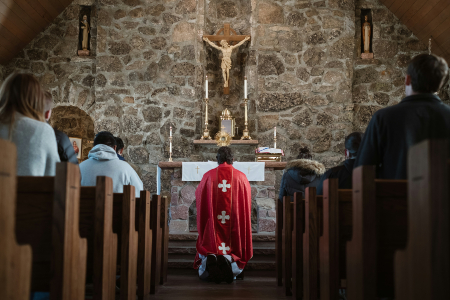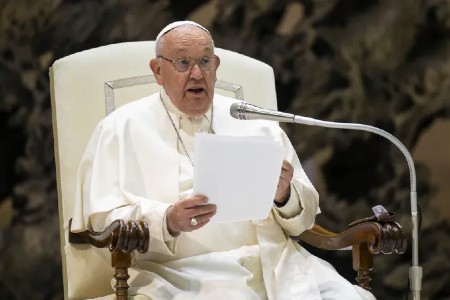 Hi readers, it seems you use Catholic Online a lot; that's great! It's a little awkward to ask, but we need your help. If you have already donated, we sincerely thank you. We're not salespeople, but we depend on donations averaging $14.76 and fewer than 1% of readers give. If you donate just $5.00, the price of your coffee, Catholic Online School could keep thriving. Thank you. Help Now >
Hi readers, it seems you use Catholic Online a lot; that's great! It's a little awkward to ask, but we need your help. If you have already donated, we sincerely thank you. We're not salespeople, but we depend on donations averaging $14.76 and fewer than 1% of readers give. If you donate just $5.00, the price of your coffee, Catholic Online School could keep thriving. Thank you. Help Now >
Pope John VIII
FREE Catholic Classes
(Reigned 872-82)
A Roman and the son of Gundus. He seems to have been born in the first quarter of the ninth century; d. 16 Dec., 882. In 853 and 869 he appears as archdeacon of the Roman Church, and it was as such that he became pope (14 Dec., 872). His election was opposed by Formosus, who remained in opposition to him throughout the whole of his pontificate. All modern historians are agreed that John was one of the greatest of the great popes who sat on the chair of Peter during the ninth century. Some, however, on what would seem to be insufficient grounds, regard him as cruel, passionate, worldly-minded, and inconstant. The more important acts of John's reign may be divided into four groups, according as they relate to the affairs of Eastern Europe, to the empire of the West, to Southern Italy and the Saracens, or to those persons with whom he came into more frequent contact.
A year or two before John became pope, St. Methodius, the brother of St. Cyril, who had died in Rome (869), had been sent back to Moravia as an archbishop to continue his work for the conversion of the Slavs. He had received permission to use the Slavonic language in the liturgy of the Church. This action of Pope Hadrian II did not please either the German princes or bishops. The former had designs on the political, the latter on the ecclesiastical, independence of the Moravians. Methodius was seized and imprisoned (871), and it was not till 873 that any hint of his treatment and his appeal to Rome reached John. Though for the moment, in deference to German opposition, the pope prohibited the use of the Slavonic tongue in the liturgy, he insisted on the immediate restoration of Methodius. After his orders were obeyed, John bade the archbishop come to Rome, as fresh accusations had been brought against him. A careful examination convinced John of the orthodoxy of Methodius, who was sent back to Moravia with permission to use the Slavonic tongue in the liturgy. By the pope's help the saint overcame all opposition, and continued is work of conversion till his death (6 April, 885). One result of John's work among the Slavs was that several of their tribes placed themselves under the protection of the Holy See. John also had much communication with the Eastern Slavs of Bulgaria. He strove to bring them back again under the direct jurisdiction of the Holy See. Papal rights in that country had been usurped by the patriarchs of Constantinople, and, though their faith and his, as John told the Bulgarian king Boris, were the same, he justly feared that their proneness to heresy and schism would ultimately lead the Bulgarians into both. But the Bulgarians gave no lasting heed to the exhortations of the pope, and what he foretold them would happen actually came to pass. When Basil the Macedonian mounted the throne of Constantinople, he restored St. Ignatius to his see, and banished the usurper Photius (867). During his banishment, however, adroit flattery enabled the exile to win the emperor's favour, and, on the death of St. Ignatius (877), he was acknowledged as his successor. He then spared no pains to induce John to communicate with him. This at length he agreed to do on certain conditions. But, as Photius failed to observe them, he was solemnly condemned by the pope (881).
Louis II, though not even master of Italy, bore at this time the title of Emperor of the Romans. To him, as a prince of character, John gave his support. He endeavoured to induce Charles the Bald, King of France, to yield up to him the kingdom of Lothaire; he aided him in his efforts against the Saracens, and, after his death (875), strove to comfort his widow Engelberga. When Louis II died, John's support of Charles the Bald resulted in his receiving the imperial crown (25 Dec., 875), and in the discomfiture of his rivals. Charles was not ungrateful for the pope's assistance, and not only decreed that the Roman Church, as head of all the Churches, must be obeyed by all, but in 876 waived in John's behalf many of "the rights and customs of the empire." John, however, did not obtain much practical help from him. Charles was a man who attempted to do great things, but knew not how to adapt his means to the ends he had in view. He did at last, however, come to help John against the Saracens, who distressed him throughout the whole of his pontificate. His expedition was, however, a failure, and, before he could renew his attempt, he died (6 Oct., 877). Among the candidates for the vacant imperial throne, John thought that the only suitable one was Boso, soon to be King of Provence. But Boso would not move in the matter, so that at length the pope, setting aside the claims of Carloman on the ground of his ill-health which had forced him to entrust the care "of the Kingdom of Italy " to John himself, fixed upon Charles the Fat as the imperial successor of Charles the Bald, successfully established his candidate on the imperial throne, and crowned him in February, 881.
Before John died, Charles had become in name, at least, the recognized sovereign of most of the states over which Charlemagne had held sway. But he was physically and mentally unfit for his position; yet John was in great need of help. From the first year of his reign to the last, he was harassed by the Saracens, and was worried by the unpatriotic conduct of some of the princes of Southern Italy, by intrigues at home, and by the encroachments of Guido II, Duke of Spoleto. In 840, colonies of Saracens had begun to establish themselves in South Italy. John had to write "that all our coasts have been plundered, and the Saracens are as much at home in Fundi and Terracina as in Africa." To make head against these terrible enemies of Christianity John spared not his person, his time, nor his money. He never ceased striving to stir up the emperors to take a high view of their position and responsibilities, to put aside their miserable ambitions, and to take the field against the unrelenting foes of their faith and country. By conferences with the petty princes of Southern Italy, and by gifts of money to them, he endeavoured to detach them from alliance with the Saracens, or to unite them in battle against them. But he was not content with urging others to take action against them. He himself assumed the duties both of a general and an admiral. He fortified St. Paul's Outside-the-Walls , where his works were so extensive that they deserved to be called after his name "Johannipolis." The new fortification was over two miles in circumference. To guard the "city of the old dotard Peter," as the Saracens contemptuously called Rome, John himself patrolled the coast. He overtook the pirate fleet of the Saracens off the promontory of Circe, and was completely victorious over them (876). But knowing they were but scotched, he implored the emperor to help him to make his victory of permanent value. Charles the Bald was not unwilling to help, but died (877) before he could effect anything. John had therefore to go on fighting single-handed against the Saracens till his death.
During the whole period of his pontificate, John was troubled almost as much by enemies in and around Rome as he was by the Saracens. When he mounted the throne of Peter, he found many of the chief offices of the Church in the hands of disreputable nobles, most of them connected with one another, and with a number of women who were as bad as themselves. Among the former were Gregory, the primicerius of the Roman Church, a shameless peculator; his brother Stephen, the secundicerius, as deep in crime as himself, and his infamous son-in-law, the murderer and adulterer, George of the Aventine. Allied with these, by crime at least, were Sergius and Constantiana. With some of these men, Formosus, Bishop of Porto, had the misfortune to be linked by some ties of friendship. The death of the Emperor Louis II (August, 875), who had been a patron of some of this nefarious clique, left John more at liberty to deal with them. When he began to proceed against them, they succeeded for a time in avoiding appearing before him. Meanwhile they hatched plots against him, and sought to obtain the aid of the Saracens. Finding at last that the pope was too strong for them, they fled from the city, carrying with them the treasures of the Church. Unfortunately for his reputation, Formosus fled with them. Failing to appear for trial, the exiles were degraded and excommunicated. When in France, whither Formosus bad fled, John caused the sentence passed against Gregory and his party to be repeated, and insisted on Formosus's signing a declaration that he would never return to Rome (878). John had not gone to France altogether of his own free will. Acting ostensibly in the interests of Carloman of Bavaria, who was aspiring to the empire, Lambert, Duke of Spoleto, put all the pressure he could on the pope, constantly harrying his territory (876). At length he seized Rome itself (878). Unable to endure the persecution of this petty tyrant, and anxious at the same time to come into personal contact with the different candidates for the imperial throne, vacant since the death of Charles the Bald (6 Oct., 877), John went to France. While there he crowned Louis as king (Sept., 878), but was unable to effect anything in the way of obtaining a suitable candidate for the empire.
John's action was not confined to Italy, Germany, and France. In Spain we find him constituting Oviedo a metropolitan see. By his influence, also, a law against sacrilege was added to the Gothic Code of Spain. John received in Rome Burhred (Burgraed), King of Mercia, whom the miseries which the Danes were causing throughout England had driven to seek peace at the shrine of the Apostles. Edred, Archbishop of Canterbury, also turned to the pope for consolation. He was distressed by the Danes and worried by King Alfred, who in his youth was not the wise monarch he afterwards became. John wrote to commiserate with him, and told him that he had written to urge the king to offer proper obedience to him. Most contemporary historians tell us simply that John died on 16 Dec., 882. One, however, who wrote in distant Fulda, has given certain terrible details which are not accepted by the best modern historians. According to the annals of that monastery, one of John's relations, who wished to seize his treasures, tried to poison him. Finding, however, that the drug was doing its work too slowly, he killed him by striking him on the head with a hammer. Then, terrified by the hostility which was at once manifested towards him, he fell dead without any one laying a hand upon him. This introduction of the marvellous and the wrong date which the Fulda annals assign to John's death have justly rendered this narrative suspected.
We ask you, humbly: don't scroll away.
Hi readers, it seems you use Catholic Online a lot; that's great! It's a little awkward to ask, but we need your help. If you have already donated, we sincerely thank you. We're not salespeople, but we depend on donations averaging $14.76 and fewer than 1% of readers give. If you donate just $5.00, the price of your coffee, Catholic Online School could keep thriving. Thank you.Help Now >
 Hi readers, it seems you use Catholic Online a lot; that's great! It's a little awkward to ask, but we need your help. If you have already donated, we sincerely thank you. We're not salespeople, but we depend on donations averaging $14.76 and fewer than 1% of readers give. If you donate just $5.00, the price of your coffee, Catholic Online School could keep thriving. Thank you. Help Now >
Hi readers, it seems you use Catholic Online a lot; that's great! It's a little awkward to ask, but we need your help. If you have already donated, we sincerely thank you. We're not salespeople, but we depend on donations averaging $14.76 and fewer than 1% of readers give. If you donate just $5.00, the price of your coffee, Catholic Online School could keep thriving. Thank you. Help Now >
Join the Movement
When you sign up below, you don't just join an email list - you're joining an entire movement for Free world class Catholic education.
-

-
Mysteries of the Rosary
-
St. Faustina Kowalska
-
Litany of the Blessed Virgin Mary
-
Saint of the Day for Wednesday, Oct 4th, 2023
-
Popular Saints
-
St. Francis of Assisi
-
Bible
-
Female / Women Saints
-
7 Morning Prayers you need to get your day started with God
-
Litany of the Blessed Virgin Mary
U.S. Catholic Parishes Experience Resurgence of Traditional Practices
-

Pope Francis Urges Faith and Prayers for Peace
-

Florida Welcomes Volunteer Chaplains to Public Schools
-
10 Fascinating Details About St. Joseph the Worker: Celebrating His Feast Day - May 1
-
St. Joseph the Worker: Model for Men, Young and Old
Daily Catholic
 Daily Readings for Thursday, May 02, 2024
Daily Readings for Thursday, May 02, 2024 St. Athanasius: Saint of the Day for Thursday, May 02, 2024
St. Athanasius: Saint of the Day for Thursday, May 02, 2024 The Our Father: Prayer of the Day for Thursday, May 02, 2024
The Our Father: Prayer of the Day for Thursday, May 02, 2024- Daily Readings for Wednesday, May 01, 2024
- St. Marculf: Saint of the Day for Wednesday, May 01, 2024
- To Saint Peregrine: Prayer of the Day for Wednesday, May 01, 2024
![]()
Copyright 2024 Catholic Online. All materials contained on this site, whether written, audible or visual are the exclusive property of Catholic Online and are protected under U.S. and International copyright laws, © Copyright 2024 Catholic Online. Any unauthorized use, without prior written consent of Catholic Online is strictly forbidden and prohibited.
Catholic Online is a Project of Your Catholic Voice Foundation, a Not-for-Profit Corporation. Your Catholic Voice Foundation has been granted a recognition of tax exemption under Section 501(c)(3) of the Internal Revenue Code. Federal Tax Identification Number: 81-0596847. Your gift is tax-deductible as allowed by law.









 Daily Readings for Thursday, May 02, 2024
Daily Readings for Thursday, May 02, 2024 St. Athanasius: Saint of the Day for Thursday, May 02, 2024
St. Athanasius: Saint of the Day for Thursday, May 02, 2024 The Our Father: Prayer of the Day for Thursday, May 02, 2024
The Our Father: Prayer of the Day for Thursday, May 02, 2024

